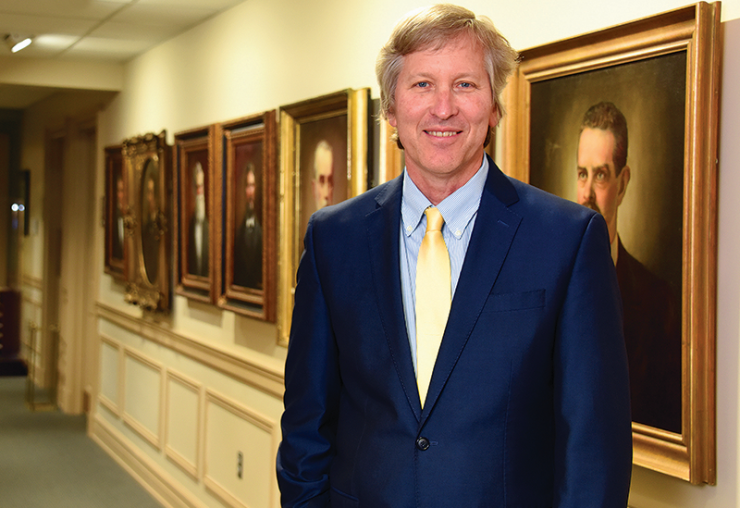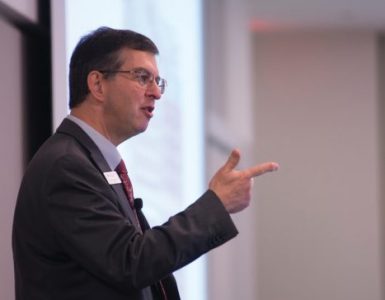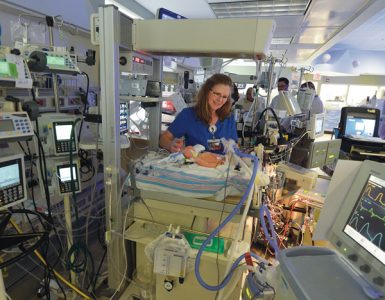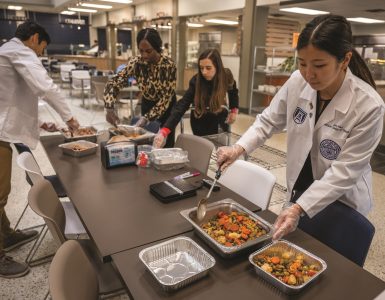This year has been unparalleled in my lifetime, and I am certain that many of you feel the same. While I hope that this pandemic has not brought tragedy directly into your lives, I know it has brought pain because of the suffering of others. The sickness and death that we work so hard as physicians to stop. The loss of jobs, businesses and homes. The uneasiness about simple, routine parts of life like having lunch with a friend or shaking their hand. This pandemic has touched pretty much every aspect of what we do and who we are.
But there has been greatness in all this. In people like MCG graduate and (recently retired) Phoebe Putney Hospital CMO Dr. Steve Kitchen (see page 6) who stood diligent as Albany, Georgia emerged as an early and seemingly unlikely hotspot for this virus. In medical students like now Dr. Rebecca DeCarlo, a 2020 graduate (see page 25) and Gainesville, Georgia native, who, undeterred by the interruption of her last year of medical school, worked to help the Georgia Department of Public Health develop contact tracing protocols, helped train more than 200 faculty and students on this preventive measure, and made countless phone calls herself. She would be honored for her effort at the White House this past May. In the physicians, nurses, respiratory therapists and other team members here and across the globe who continue to put their own safety at risk to do what we do.
I am proud to reiterate here as I have many times over these long months that you, our graduates, and our faculty, staff, students, residents and fellows who define MCG have continued to make me so proud and grateful for the privilege I have to lead such a great medical school.
As I have also said, even while dealing with this additional adversity, MCG has continued to come into its own, growing our class, growing our research, as President Keel shares in this issue of MCG Medicine, and adding more great faculty. Some of the growth, particularly in research, is thanks in part to the new leaders we talked about in the last issue of our magazine, in Fall 19/Winter 20.
We now have more new leaders like Dr. Steven Brooks, a pediatric ophthalmologist who has successfully transitioned between academic medicine and private practice and comes back to us as chair of the Department of Ophthalmology with the beginning of this new year. Dr. Brooks comes back to us from Columbia University Irving Medical Center in New York, where he was chief of pediatric ophthalmology. Dr. Brooks was on the MCG faculty from 1994-2001, and was in a successful private practice for a dozen years before becoming a faculty member at Columbia. I have heard from many of you how glad you are about his return. Dr. Dean Seehusen, is the new chair of the Department of Family Medicine, replacing longtime chair and MCG graduate and icon Dr. Joseph Hobbs. Dr. Seehusen has two decades of academic experience. He first came to MCG in 2018 from the U.S. Army, where he was most recently director of medical education and designated institutional official for Dwight D. Eisenhower Army Medical Center at Fort Gordon, Georgia. He came to us as associate dean for graduate medical education and quickly showed his leadership ability. His accomplishments include serving as deputy editor of the Journal of the American Board of Family Medicine, which is relocating its editorial office to MCG.
We have named Dr. Mark Hamrick, a bone and muscle biologist who has helped lead our tremendous growth in the field of aging research, as senior associate dean for research. Dr. Hamrick also has been a longtime great colleague and advocate for all scientists here and now will help us continue to grow our science in key areas of health concern for our state and nation including cardiovascular disease, neurological problems, cancer, aging, vision and genomics.
It has been a good year for science here. National Institutes of Health funding, the gold standard for biomedical research, has increased nearly 25% in the past year. The National Heart, Lung and Blood Institute, has long been our biggest source of funding, and that funding has increased 30% over the last 10 years, largely thanks to the outstanding work at the Vascular Biology Center as well as the Georgia Prevention Institute and our Department of Physiology. Funding from the National Institute on Aging now is number two at MCG. Funding from the National Eye Institute has increased threefold in a decade, thanks in large part to the concerted effort of Cellular Biology and Anatomy Chair and Retinal Cell Biologist Dr. Sylvia Smith who has helped lead the James and Jean Culver Vision Discovery Institute since it started in 2008, and which Dr. Brooks will codirect. In fact, just a few months ago Dr. Smith received a $3 million NEI center core grant that will help provide critical infrastructure to further support complex vision studies.
Key needs to keep this momentum include recruitment of more scientists and more/better research space for them. I am very excited about this increased effort and success on our scientific front.
Very close to your heart and mine, is the core of our being, our medical students. I am happy to say we are on an upward trajectory there as well with the first increase in the class size in Augusta since 2006, from 190 to 200 students, coming this fall as part of movement toward annual increments until we reach a total class size of 300. Please know the current Class of 2024 already includes 10 more students, which brought the number of students at our AU/UGA Partnership campus in Athens to 50 and all told to 240. Next year the student number in Athens will grow to 60, with the remainder of medical student growth slated for Augusta. For a little perspective, the mean size of a medical school class is about 144 students at the nation’s allopathic medical schools, according to the Association of American Medical Colleges, and the largest class size is Indiana University School of Medicine with 365 students.
I really appreciate the opportunity to grow our class with the goal of better meeting the needs of a rapidly growing state that ranks in the top 10 in population but 39th in the number of physicians per capita. I am excited as well about the most innovative curriculum ever at MCG that started this year with multiple important goals, which include enabling students with a commitment to primary care being able to finish their core work in three years and get on with their residency in their fourth year. For those who pursue other specialties, there are multiple, good options for that fourth year, including a year of research, a year of intense pre-resident focus on their chosen specialty and pursuing a dual degree like an MD/MBA. We call our new curriculum a tailor-made medical education, and while there are always tradeoffs to change,
I believe this is an efficient and effective approach to medical education that will help ensure the legacy of MCG as a place where great physicians learn.
Finally let me say to each of you again how much I have missed being with you over these many months, how much I appreciate your support of your medical school and how I hope we can soon again shake hands.










